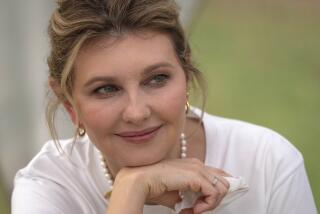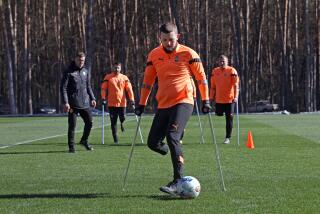A Born Nurturer Does It Her Way
- Share via
KHARKIV, Ukraine — When she was 8, the girl’s future seemed like a closed book. She would spend her life lying or sitting, unable to move, in a provincial town’s home for the disabled.
Then, one day in 1992, something incredible happened. A young woman came and took away her best friend, also 8.
Distressed, the girl, whose name was Sveta, begged the woman, Svetlana Bondareva, to rescue her too.
“I was shocked, to be honest,” recalled Bondareva, explaining that Sveta had one arm and no legs. “She couldn’t move. I was not sure she’d ever be able to walk at all.”
Bondareva grew up in the Soviet Union, where disabilities and adoption were both highly stigmatized. They still are in most former Soviet republics. But Bondareva, a large, soft-spoken woman with a benign smile, is extraordinary.
She adopted a large group of disabled and abandoned children whose lives otherwise would have been bleak and oppressive.
Since the fall of the Soviet Union, the number of orphans and abandoned children in the former U.S.S.R. has risen sharply. There are now 700,000 in Russia alone, more than in the entire Soviet Union at the end of World War II, which claimed more than 20 million Soviet lives.
In Russia, Ukraine and other former Soviet republics, the long, tough transition to a market economy has incurred a significant social cost: unemployment, alcohol abuse and crime. Welfare agencies are alarmed by the sheer numbers of orphaned and abandoned children. The latter’s parents are often alcoholics or in jail.
Bondareva was 22 when she confronted her dilemma about whether to take in Sveta. By then, she had already adopted six children, three of them disabled.
She did go back to collect Sveta, and that same day took home two other children. But that wasn’t the end. So far, she has rescued 15 children, six with disabilities.
Sveta is now 17. She is mobile with the help of artificial limbs. She loves to read novels and poems, feed the family pets and teach her younger siblings. And she wants a job in the medical field.
The idea of Bondareva, a 32-year-old with a negligible income, adopting 15 children would be unthinkable in the West--and is controversial here too. But in Ukraine and Russia, the children she chose--mostly disabled or well beyond toddler age--had little other chance to be adopted.
She Chose Children Over Her Boyfriend
Bondareva feels her burden. Before she made her first adoption, her boyfriend told her to choose between him and the child. They broke up, and she has stopped thinking of marriage.
“I have never met the kind of person who could devote all his life to the children,” she said.
A religious woman, she shrugs off the notion that she has done something remarkable.
“It is really hard to say what pushed me to start it all--probably because I love children very much,” she said. “The reason I have so many children is that I want to help more and more of them.”
In building her large and loving family, Bondareva had to push against tradition. Child-care authorities in the northeastern city of Kharkiv are highly critical because she shunned the preferred model in which foster parents are paid state salaries to care for seven to 10 children.
Although she would receive nine times more money under that system, Bondareva rejected it because her children would have had to move into hostels at 16 to 18 years of age.
“As an expert, I do not understand her,” said Svetlana Gorbunova-Ruban, the official in charge of orphans and abandoned children in the Kharkiv administration. “It’s quite evident that financially she cannot bring up such a large number of children. It is like a monastery.”
However, Bondareva never had a problem getting approval from local adoption committees, and she only once ran into opposition from an orphanage official. That was because she was single and the children would have no father.
“I told them that in an orphanage, children have no family at all,” she recalled. She won the argument.
There is an air of comfortable chaos in the Bondareva household. The children eat meals in two sittings around a small table that occupies almost all of the tiny kitchen’s floor space.
Her oldest, Natasha, has married and left home. All 12 daughters and three sons, ages 2 to 21, radiate confident energy. Their rambling apartment is crammed with dogs, cats, toys, bird cages, posters, fish tanks, books and athletic equipment.
The girls love to do one another’s hair in elaborate styles. On family walks, the children look out for one another, singing out when a car approaches, calling to the younger ones not to stray or chiding one another for getting dirty.
They have soaring ambitions, planning to get jobs as lawyers, medical workers or systems analysts. They study hard, and the six disabled children are capable of looking after themselves. Bondareva believes that most will find jobs and that all will live independently.
For children in state orphanages or homes, the future looks much more grim. Some with severe disabilities face life in adult institutions.
Orphans and abandoned children are discharged from state care and are supposed to get a job and an apartment. But few do.
According to the Russian prosecutor general, 15,000 orphans in Russia leave orphanages annually. Within five years, one in 10 will have committed suicide. One in five will have a criminal record; one-third will be unemployed; 40% will be homeless. Equivalent figures are not available for Ukraine, although the problems there are similar.
When Bondareva was 12, her father, grandfather and two grandmothers died within a few months of one another, leaving her alone with her mother.
“I felt it very acutely. I thought, ‘How can other children live without any parents?’ I decided when I grew up I would take in orphans,” she said.
So at 14, she began collecting addresses of orphanages. At 16, she began writing to children in orphanages. At 20, she adopted her first child, Marina, then 9, who still lives with her.
She Realized It Was Up to Her
She never set out to adopt disabled children--just to write to them and send gifts. But once the letters started, she decided--with the encouragement of her mother--that if she did not adopt them, no one else would.
So in her early 20s, with trepidation, she visited a home for disabled children.
“I was so scared I walked around the building twice before going in. I didn’t know what awaited me behind those doors. Ordinary people don’t go into those places,” she said.
When Bondareva at first brought home children with disabilities, many people teased and pointed fingers.
“People are not used to seeing invalids. They are kept out of the public eye. At first, it was hard. But in order to live in the society, you have to learn not to pay attention to these things,” Bondareva said.
Bondareva’s children are typical of “orphans” in Russia and Ukraine, 95% of whom have one or two living parents. They end up in state care because of parental alcoholism or neglect, or because one or both parents are in jail. It is usual to give up disabled children.
Some orphanages in poor regions have as little as 5 rubles a day (17 cents) to feed each child.
Conditions in homes for disabled children also vary sharply. A 1998 Human Rights Watch report cited cases of humiliating punishment, neglect, and physical and sexual abuse.
Many in the West would be uncomfortable with the fact that Bondareva has concealed from the younger children the fact that they are adopted.
Yet she is a product of her culture. Secrecy in adoptions is fiercely protected by Ukrainian law, and parents here rarely tell children they are adopted or reveal the details of their past.
Fake Baby Pictures Put in Albums
Bondareva pasted fake baby photos into personal albums for each of the children, convinced that every person must have a baby picture.
The older children remember their institutional lives. But none of the children have any contact with their birth parents or siblings.
“We completely avoid discussing the past. The children don’t want to remember something unpleasant. They don’t want to remember that they were adopted, and they don’t want to be reminded that they are disabled, not like others,” Bondareva said, firmly ruling out any questions to her children on these subjects.
The older ones made a decision not to discuss the past at a family meeting, she said. “We don’t have adopted children here. I tell them they are my birth children. The older ones know the truth, but they hide it from themselves.”
However, several of her children mentioned the sacrifice their mother made in adopting them. To them, she is a hero.
“What distinguishes her is that she took us all in,” said Tonya, 14. “She devoted all of her life and health to us.”
More to Read
Sign up for Essential California
The most important California stories and recommendations in your inbox every morning.
You may occasionally receive promotional content from the Los Angeles Times.













